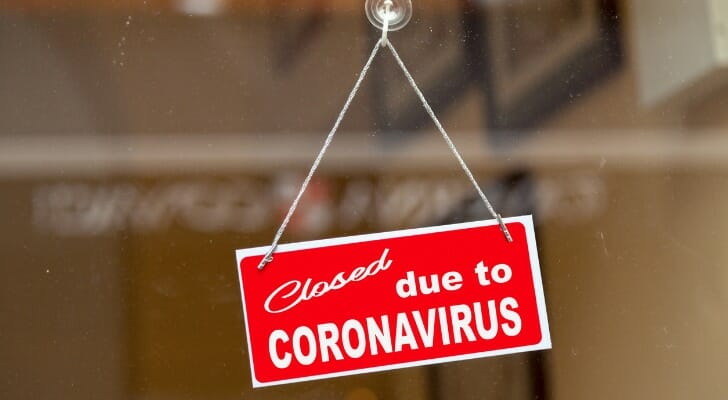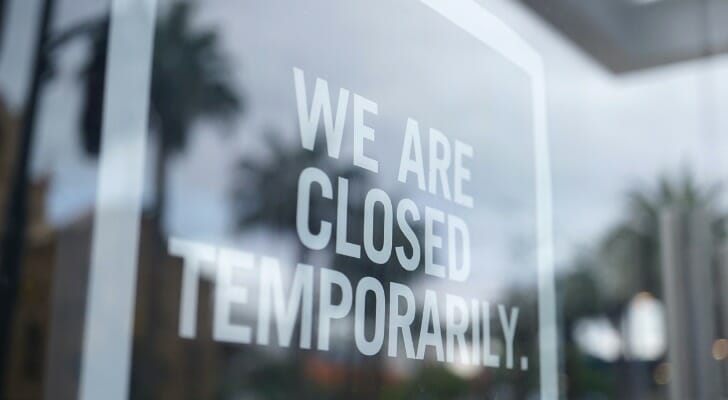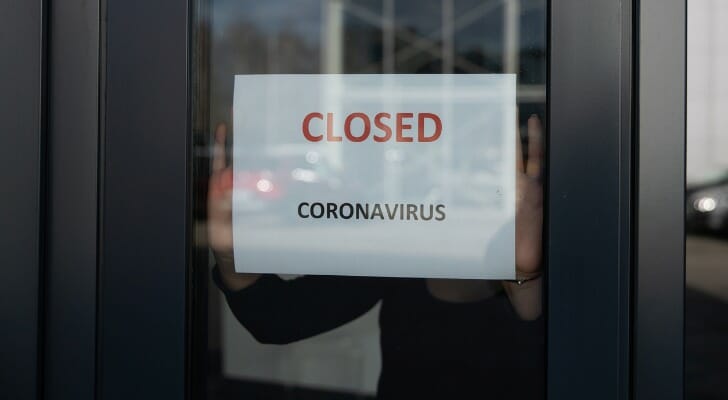The coronavirus pandemic has impacted every aspect of American life, including small businesses. With most Americans practicing extreme social distancing, businesses of all sizes have a dearth of customers. In some major markets, including New York, California and Chicago, governments have issued rules mandating that all non-essential businesses close and that restaurants only offer take-out and delivery. All of this has put an enormous strain on small businesses and led to a massive uptick in unemployment.
Fortunately, some help is on the way. On Friday, March 27, President Trump signed a coronavirus stimulus package known as the Coronavirus Aid, Relief, and Economic Security Act (CARES) Act, which contains provisions intended to aid small businesses. In addition, some states have put together relief packages to help these small businesses make it through this increasingly difficult time. SmartAsset has rounded up all of these programs, along with information on how you can apply for them.
Check the SBA Coronavirus Response page for updated info (updated every few days during pandemic)
Federal
The $2 trillion stimulus package includes $350 billion in small business loans and $500 billion in loans for distressed companies.
These small business loans — known as the Paycheck Protection Program — will be run through the same infrastructure as existing 7(a) loans from the Small Business Administration. Loans will be for up to $10 million dollars and are guaranteed at 100% by the SBA. Some of these loans will be forgivable, so if certain requirements are met they may end up functioning more as grants for the business.
President Trump has also signed legislation to support low-interest disaster loans for any business impacted by coronavirus. These loans are administered by the small business administration and are available for up to $2 million in states where an economic disaster has been declared. The interest rate is 3.75% for businesses and 2.75% for nonprofits. The term of the loan varies by applicant but could be up to 30 years. Interested small business owners can apply here. Make sure you also understand your business interruption insurance coverage.
Additionally, don’t forget that the 2020 deadline for filing taxes has been pushed back to July 15 for both individuals and businesses. More federal relief efforts are likely to be coming in the days and weeks ahead.
Check the SBA Coronavirus Response page for updated info (updated every few days during pandemic)
How Do I Qualify?
For the federal programs, you qualify based on the size of your business and proving that you were negatively impacted by the COVID-19 pandemic. Normally, there are much more stringent requirements and documentation for an SBA 7(a) loan, but the loans offered under the CARES Act are being given under loser guidelines, allowing banks to get money to companies quickly so they can cover things like rent and payroll.
There are also individual state and local programs, described below, each of which has their own guidelines. Generally, though, you’ll need to prove your business is under a certain size and has been impacted negatively by COVID-19.
How Much Do I Get?
The size of these loans largely depends on what you ask for and what you need. The Paycheck Protection Program loans offered under the CARES Act are for up to $10 million or 2.5 times the companies monthly payroll cost. The federal disaster loans are for up to $2 million.
Each state program has its own maximum amount. Below, we break down these programs, so find your state to see what you may be eligible for.
How Do I Apply?
To get a loan under the Paycheck Protection Program, you’ll need to talk to a local lender.
Paycheck Protection Program (rehire your employees and receive forgivable loans if you keep them)
The Paycheck Protection Program prioritizes millions of Americans employed by small businesses by directing $349 billion towards job retention and business operating expenses.
Program Overview
The Paycheck Protection Program is designed to provide a direct incentive for small businesses to keep their workers on payroll by providing each small business a loan up to $10 million for payroll and certain other expenses.
If all employees are kept on payroll for eight weeks, SBA will forgive the portion of the loans used for payroll, rent, mortgage interest, or utilities. Up to 100 percent of the loan is forgivable.
Eligibility
Businesses – including eligible non-profits, Veterans organizations, Tribal concerns, sole proprietorships, self-employed individuals, and independent contractors described in the Small Business Act – with 500 or fewer employees may apply.
Businesses in certain industries may have more than 500 employees if they meet the SBA’s size standards for those industries.
Other Assistance
In response to the Coronavirus (COVID-19) pandemic, small business owners in all U.S. states, Washington D.C., and territories are currently eligible to apply for disaster assistance.
Enhanced Debt Relief is also available in SBA’s other business loan programs to help small businesses overcome the challenges created by this health crisis.
For information on additional Lending options, please click here.
SBA provides local assistance via 68 district offices and a nationwide network of resource partners. To find resources near you, please click here.
Each state plan has its own application process, some are described below.
Arizona
Arizona has passed a $50 million bill for coronavirus relief, but leaves much of the details in the hands of Gov. Doug Ducey. For this reason, more details aren’t available at this time in terms of how exactly it will help small businesses or what businesses will need to do to get funds. The bill does specify that businesses and nonprofits with fewer than 50 employees will receive relief.
Arkansas
Gov. Asa Hutchinson has announced that the state will use $12 million from Community Development Block Grants and $4 million from the state’s Quick Action Closing Fund to help small businesses struggling during the outbreak.
California
A number of programs are available in California, one of the states most impacted by the COVID-19 pandemic.
San Francisco has a Small Business Resiliency Fund for businesses that have between one and 25 employees, have less than $2.5 million in gross receipts and can demonstrate a loss of revenue of 25% or more. To apply for this program click here.
Los Angeles is offering microloans to small businesses of between $5,000 and $20,000. The term goes between six months and five years. The rate is 0% for a term of between six months and one year and between 3% and 5% for loans with a term of between one year and five years. Up to $11 million in these loans will be available.
Colorado
Denver, the largest city in Colorado, is offering businesses up to $7,500 if they are in an industry that is particularly impacted by the crisis. There still aren’t many details on how this program will work, but interested businesses can fill out a form here.
Delaware
Gov. John Carney announced that restaurants, bars, hotels and other hospitality businesses will be eligible for the Hospitality Emergency Loan Program (HELP), offering no-interest loans at up to $10,000 per business per month. The loans have a 10-year term and have payments deferred for nine months. To be eligible, a business must have been operating for at least a year, have annual revenue below $1.5 million and be in a hospitality-connected industry. You can email [email protected] to see if you qualify or call 302-739-4271 with more questions.
Florida
Gov. Ron DeSantis activated the Florida Small Business Emergency Bridge Loan Program, giving short-term interest free loans to small businesses impacted by COVID-19. Up to $50 million has been allocated for the program, Each loan is for one year and can for up to $50,000. Apply for the program online here.
Georgia
Georgia has delayed registration and registration fees for all corporations.
Illinois
Chicago, Illinois’ largest city, is working with the Catalyst Fund and private sponsors to offer the Chicago Small Business Resiliency Loan Fund. It will provide more than $100 million in low-interest loans to businesses severely impacted by the crisis, focusing on historically under-resourced communities. Up to $50,000 will be available to a single business. The program launches March 31, but interested businesses can fill out an interest form here.
Iowa
Iowa has launched the Iowa Small Business Relief Program, giving assistance to businesses impacted by COVID-19. The program offers grants of between $5,000 and $25,000 which can be used to help maintain operations or reopen following the pandemic. Funds cannot be used to pay debts incurred before March 17, 2020. The application deadline is March 31, and the application is available here.
Kansas
Kansas allocated $5 million for the Hospitality Industry Relief Emergency (HIRE) fund to provide bridge loans to businesses in the hospitality industry. The loans are for up to $20,000 at a 0% rate over a period of 36 months. Kansas has allocated all of the initial funds but is still asking businesses to fill out the form here to continue to collect information about businesses that need help.
Massachusetts
Penalties for paying certain taxes late have been waived for businesses impacted by the pandemic, such as restaurants.
Maryland
There are two programs available in Maryland:
- The Maryland Small Business COVID-19 Emergency Relief Loan Fund is a $75 million fund offering loans at no interest or principal payments due for the first 12 months, then converts the loan to a 36-month loan with a 2% interest rate per annum. Apply here.
- The Maryland Small Business COVID-19 Emergency Relief Grant Fund is a $50 million program offering grants of up to $10,000, not to exceed three months of demonstrated cash offering expenses for the first quarter of 2020. Apply here.
Michigan
The Michigan Small Business Relief Program will be offering grants of up to $10,000 and loans of between $50,000 and $200,000 with interest rates of 0.25%. A total of $10 million loans and $10 million in grants will be available. Loans are for companies with 100 employees or less while grants are only for companies with 50 employees or less. Funding will be available around April 1. Application details aren’t available yet but will be posted here.
Minnesota
Minnesota has created the Small Business Emergency Loan Program, making available $30 million for loans to small businesses. The loans will be for between $2,500 and $35,000. Each will be 50% forgivable and offered at a 0% interest rate. The application is not yet live but those with questions can email [email protected]
New Mexico
There is no specific COVID-19 small business assistance in New Mexico, but the state is adjusting its business-loan guarantee programs to make capital more readily available for business owners who are impacted by the crisis.
New York
The following programs are available in New York:
- New York City Employee Retention Grant Program. This is for businesses within the five boroughs of New York City with between one and four employees who can demonstrate that COVID-19 has caused at least a 25% drop in revenue. Businesses must have been in operation for at least 6 months. Businesses can get a grant covering up to 40% of their payroll, capped at $27,000. Apply here.
- New York City Small Business Continuity Loan Fund. This program is for businesses located in New York City with fewer than 100 employees who have lost at least 25% of revenue because of the pandemic. The program offers zero interest loans for up to $75,000. Fill out the pre-application here.
Oregon
The following programs are available in Oregon:
- The town of Beaverton — a suburb of Portland — has formed an Emergency Business Assistance Program. The program is for businesses with a Beaverton business license who have seen their business impacted by mandatory state guidelines. For now, that means restaurants. The program reimburses up for $2,500 a month for those businesses with 50 employees or less who can verify they are seeing an economic loss due to COVID-19. Apply here.
- Hillsboro, Oregon put committed up to $500,000 for businesses impacted by COVID-19 but the program has stopped accepting applications due to demand.
- The Jade District in Portland has up to $190,000 available for businesses impacted by the outbreak. Apply here.
Money Management Tips
- If you’re worried about your portfolio during the COVID-19 crisis, a financial advisor can help. A financial advisor can help. Finding the right financial advisor who fits your needs doesn’t have to be hard. SmartAsset’s free tool matches you with financial advisors in your area in five minutes. If you’re ready to be matched with local advisors that will help you achieve your financial goals, get started now.
- If your salary changes because of the crisis, your tax bill may change as well. Use SmartAsset’s free tax calculator to see.
Photo credit: ©iStock.com/Gwengoat, ©iStock.com/Kameleon007, ©iStock.com/djedzura







Recent Comments